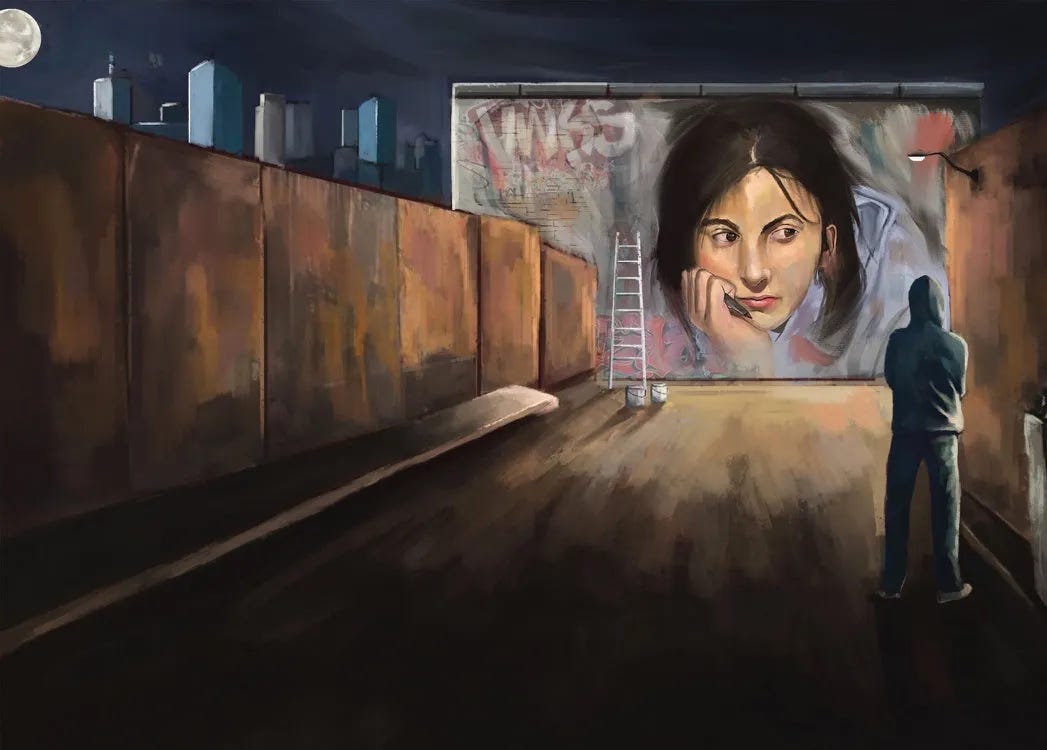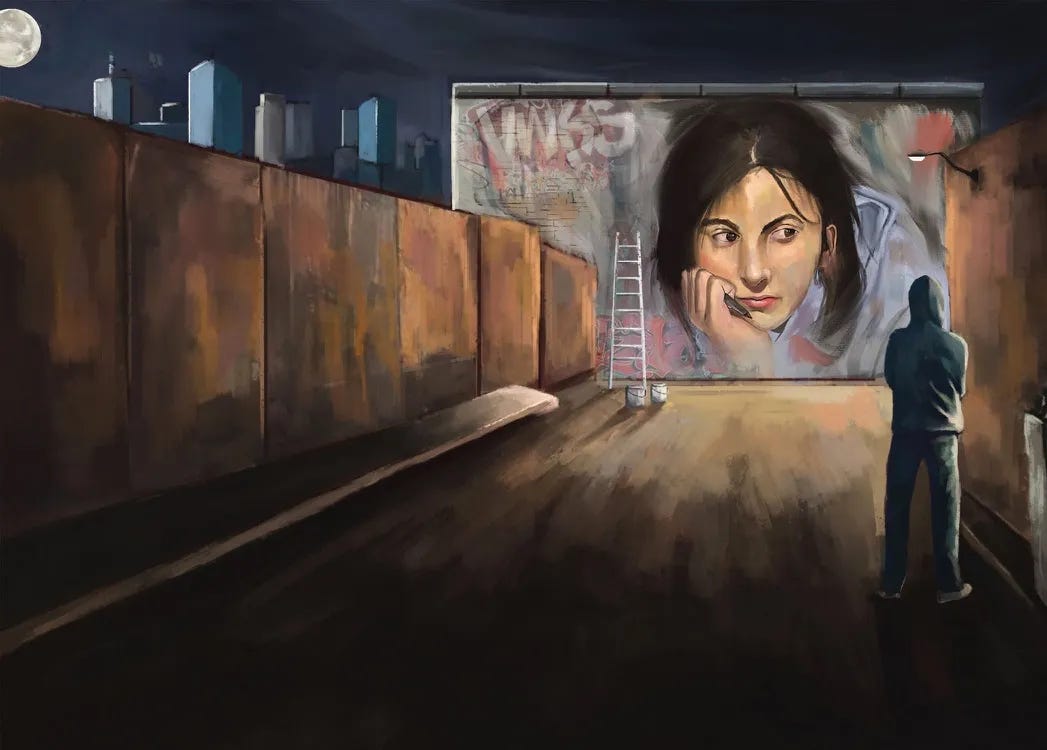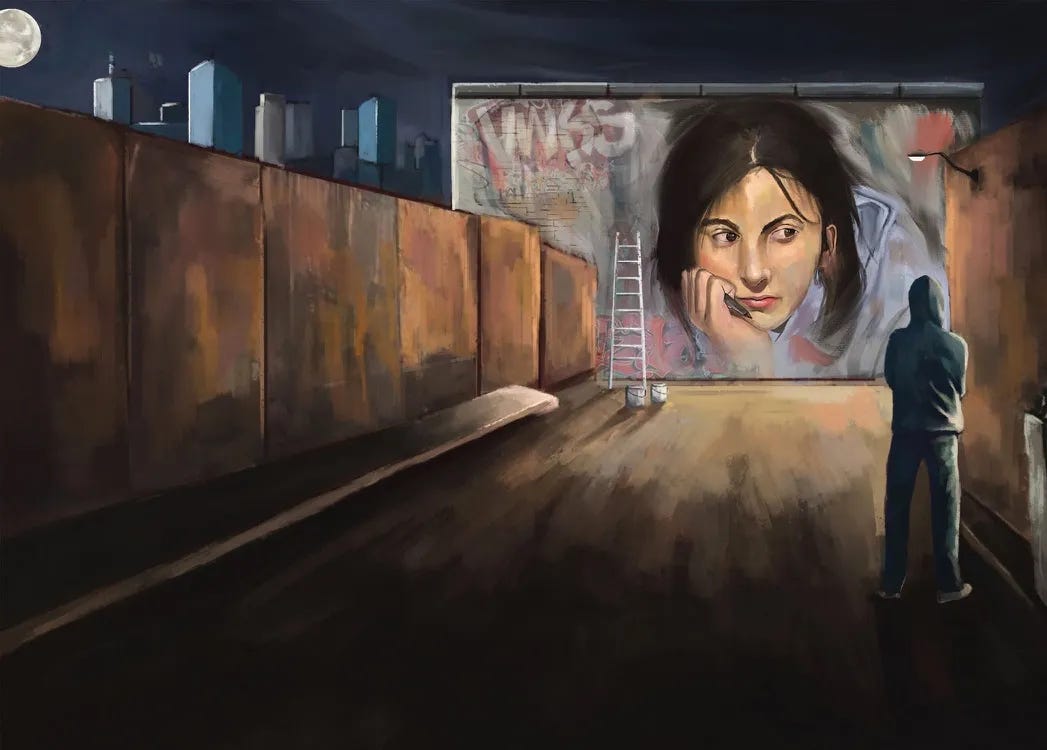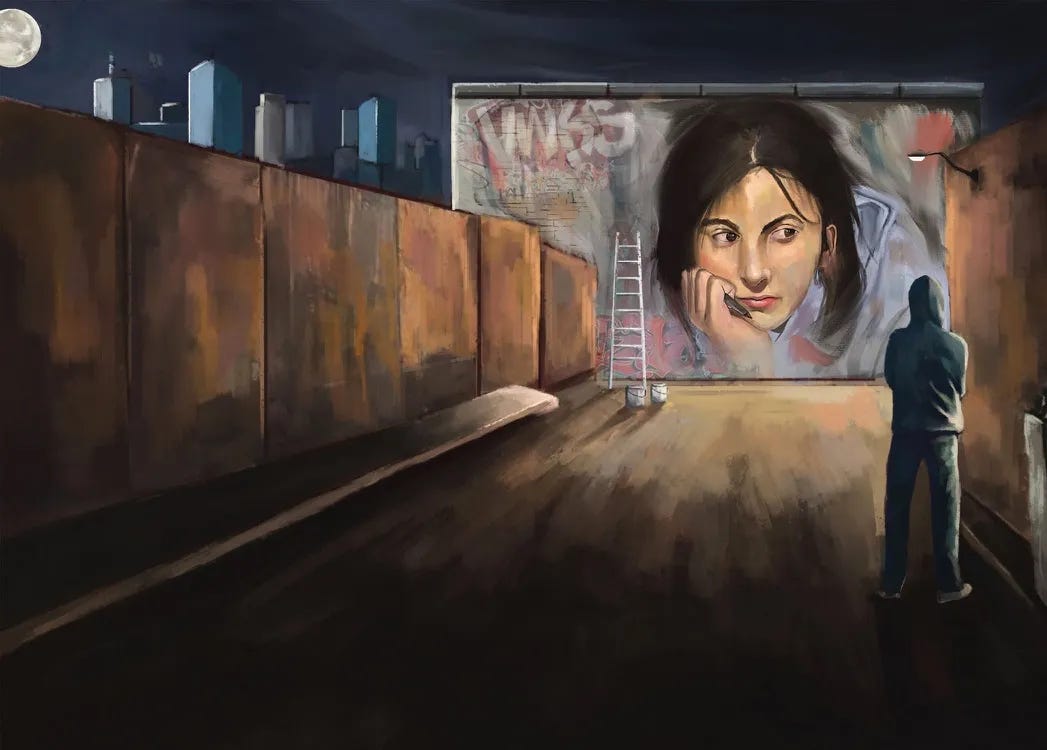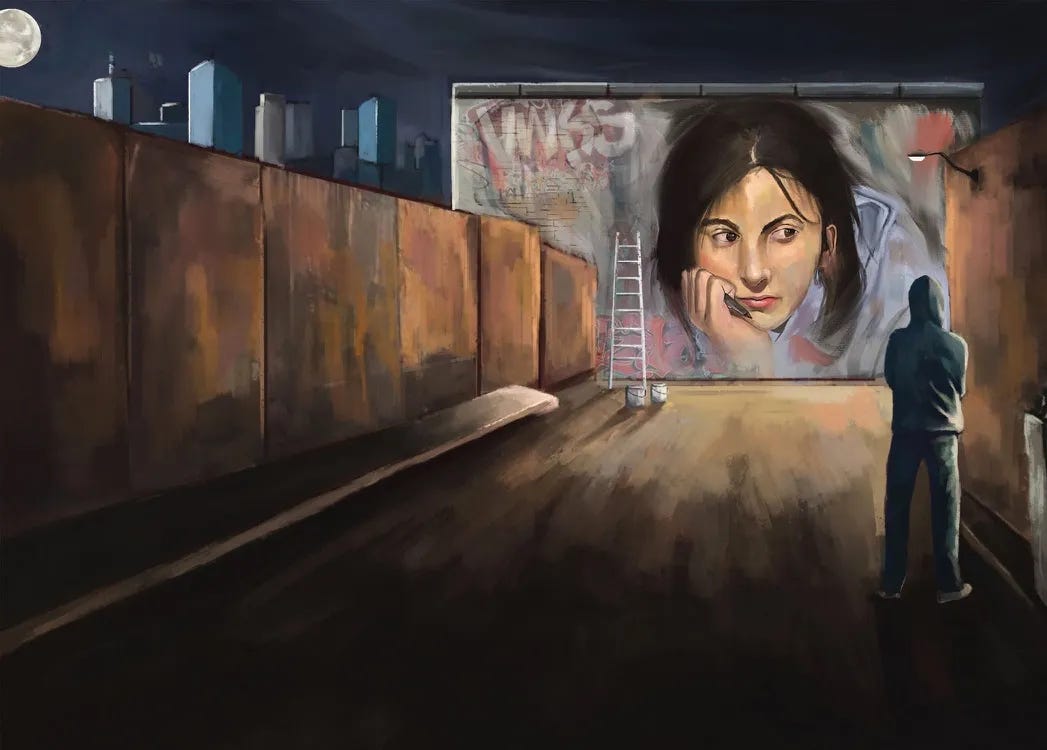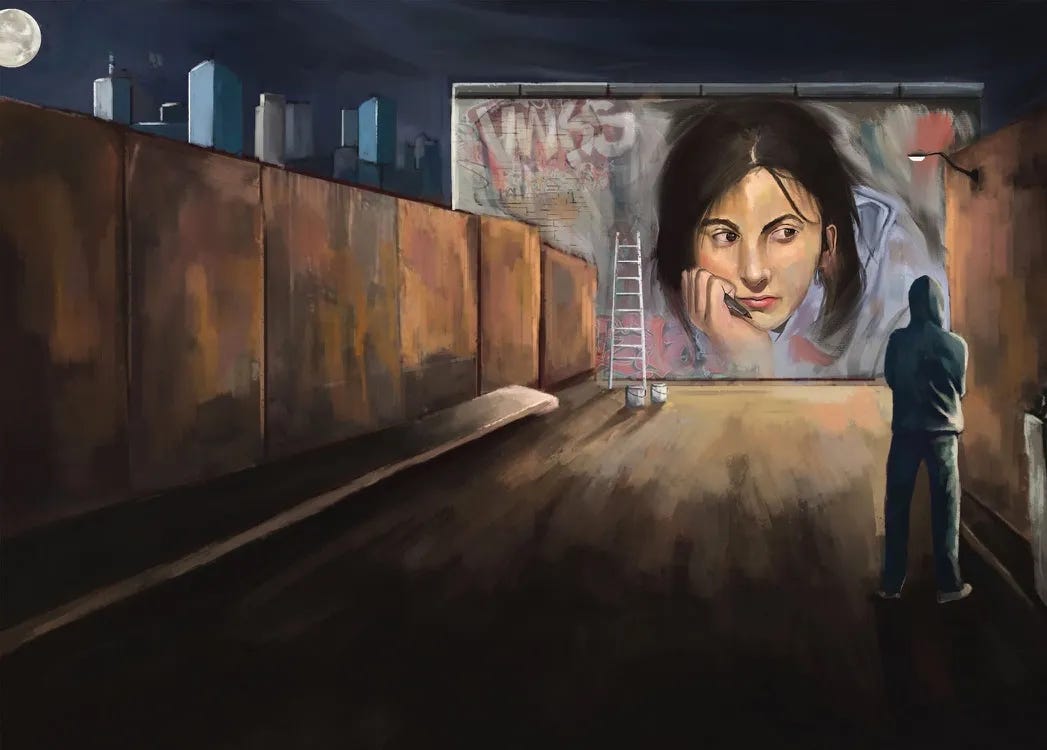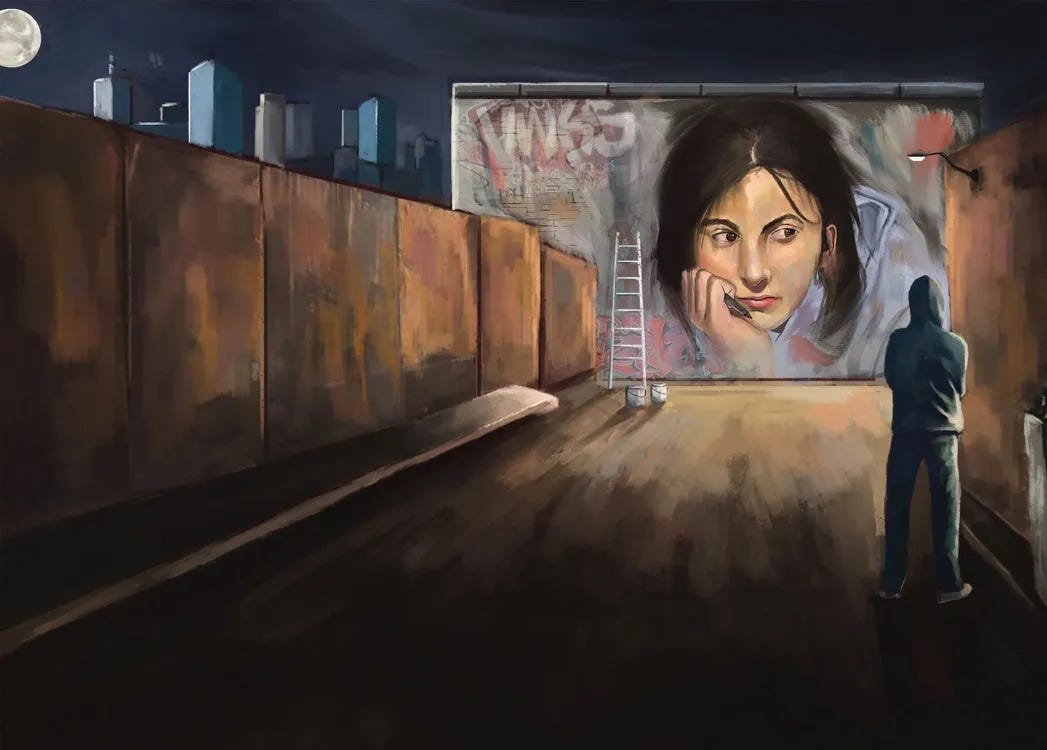
Night fell before she found the cave, but the evening was clear, the moon full, and it was not long before she stood at the edge of the clearing, a faint flickering from a fire within visible around the edges of the great bolder, their prison door.
Harriet ran to the rock and called quietly through the crack. ‘Zeph! Zeph, are you there?’
She heard a sudden scramble from inside. ‘Harriet!’ he called. ‘Harriet!’
Then he was there, pressing a bloodshot eye to the thin gap.
‘Hullo,’ she whispered. She reached up as if to touch his cheek. ‘I did it.’
‘You bloody champion! You champion. Harriet …’ His voice sounded different, strained. Was it exhaustion, she wondered? Relief?
‘Is everything OK in there?’
‘We’re OK. But you made it! You made it!’
She wanted to hug him.
‘I’ll go and get help,’ she said. Then she frowned. ‘But Zeph, what if they don’t believe me?’
‘They’ll believe you. They have to. If you talk about Stilwell and the princess. They’ll have to check it out.’
‘Harriet!’ It was Stilwell’s voice she could now hear. Zeph’s eye disappeared. Stilwell was pushing something through the crack. The two silver coins that had rested on the dead princess’s eyes. ‘Harriet, take these. They’ll know these. Show them to the king. He’ll know they come from the princess.’
Harriet took the coins.
‘And Harriet.’ It was Stilwell again.
‘I’m here,’ said Harriet.
‘Try to talk to the king. Don’t trust the priest. Attor is his name. Speak directly to the king if you can.’
‘OK,’ said Harriet. ‘How’s the princess?’
There was a moment’s silence from the other side of the boulder.
‘Sitting on her throne.’ It was Zeph’s voice. He sounded fed up. ‘Demanding. Self-absorbed. Nothing’s changed.’
‘I’ll go now,’ said Harriet. She wished Zeph was coming with her.
‘Keep safe,’ he said. ‘There’s a track on the other side of the clearing. Follow the track.’
‘It’s a clear night,’ said Harriet. ‘I’ll be fine.’
It took her longer than she thought it would to get to the town. As the crow flies it wasn’t a great distance, but making her way along a thin path at night, even with a full moon, was not easy. She tried to use the moon as a guide, but there were times when the forest canopy blocked it out and she had to guess. Three times she lost the path completely, and had to climb a hill to re-orient herself. Whenever she came to a pond or stream, she imagined the invisible presence of nixies.
But at last, just as the dawn was breaking, she came to the bridge. As soon as it was light enough to see the castle gate clearly, Harriet left the protection of the forest and approached.
At first she thought the wall was unguarded, and she began to look for the unlocked gate they’d found the first time. Was that really just six days ago? So much had happened.
‘Hold still!’ The voice came from above her. ‘Don’t move!’ Instinctively Harriet had put her hands in the air, but wondered if they only did that in the movies. The guards, however, seemed reassured.
Once she’d mentioned Stilwell’s name, and hinted that she brought news of the princess, she was marched through the gate, along the streets of the old part of town, and then up the hill to the castle. Inside, she was shown into a large waiting room.
‘It’s vital I talk to the king,’ she said, remembering Stilwell’s warning.
But it was the priest who was summoned.
Attor the priest, when he swept into the room, was dressed in his long scarlet robe. A jewelled necklace hung from his neck, rings adorned his fingers. He began a whispered conversation with the guard, during which the only words Harriet heard were a scornful ‘Oh she does, does she!’
Harriet returned his stare as he regarded her from across the room. She’d seen him only at a distance at the ceremony. Now she noticed his cold blue eyes, his cruel mouth set in a kind of supercilious sneer. His lips were fat and his teeth were slightly crooked. She felt her flesh creep as he left the guard and approached.
‘Who are you?’ he asked, smiling his nasty smile. His breath smelt of strong liquor.
‘I’ve come to talk to the king.’
‘Have you indeed? And why might that be?’
She felt stuck. Clearly she wasn’t going to get to see the king without giving some convincing explanation. But Stilwell’s warning was unambiguous.
‘I’ve got news about his daughter.’
‘What news?’
‘I’ve been told that it must be given directly to the king.’
‘The king’s daughter is dead.’
Harriet said nothing.
‘What possible news could be of interest to the king when the king’s daughter is dead?’
For a tiny moment Harriet thought she detected some stirring of raw feeling beneath the icy exterior. Something about his tone. Or the sudden eye-flicker in his fixed, icy glare.
‘Perhaps,’ said Harriet, ‘the princess is not dead after all.’
‘Perhaps,’ said Attor, equilibrium and iciness apparently restored, ‘you’d better explain yourself.’
‘I cannot say more, except to the king. I must speak to him.’
She took the two silver coins from a pocket and held them out to the priest. She could see him struggle to keep his composure. There was more going on here than just surprise, she felt sure.
‘Keep her here,’ said Attor, and he hurried out the door taking the two silver coins with him.
The next few hours were a blur.
After a brief wait, Harriet was brought before the king. He was sitting propped up in a huge canopied bed. His face was grey and gaunt and haunted, his thin white hair was uncombed, and his eyes were sad and bloodshot. His speech, too, was slurred, as if his tongue were swollen. Harriet looked into his wasted, sad face and wondered how a seemingly gentle man could have, as a daughter, such a heartless ice-maiden.
‘Attor here tells me you claim my daughter is alive,’ he said slowly. ‘He showed me the coins. Tell me how you come to have them.’
‘Can we speak in private?’
‘Answer the king,’ Attor hissed.
The king nodded vaguely.
‘I was in the cave when the princess and Stilwell were brought.’ For some reason she felt it prudent not to mention Zeph. ‘There are magic leaves that restore life. Stilwell put them on the princess’s eyes. She started to breathe. It was a miracle.’
‘I have heard of these leaves,’ said Attor. ‘This could be true.’ The priest, she noticed, was now breathing quickly. The king was staring vacantly at the ceiling.
‘I will leave at first light, majesty.’ Attor seemed suddenly breathless and quickly left the room.
Harriet was whisked away to an adjoining room. It might have been the princess’s before she was married. Harriet didn’t register much, just the big bed. A maid took her by the elbow, led her to a second room full of steam and helped her into an enormous bath. It smelt of pine forests, of lavender. She dozed in the water, was dried by the maid and dressed in the softest of night dresses. The bed itself was clean and warm.
Harriet slept the sleep of the dead.
The trek to the cave was uneventful. The forest looked so different by day, so much less a place of magic and menace. Harriet walked amongst a group of about forty eager soldiers, all of whom had apparently heard the rumour that the princess was alive. Attor rode in a large covered litter.
They were soon at the cave entrance. Harriet could hear Stilwell call out, his voice muffled but happy. The boulder was rolled back and Harriet watched as a smiling but filthy Stilwell emerged. And then the princess, immaculate and haughty. Attor greeted her warmly and then helped her into the litter.
Zeph was last, unnoticed in the general excitement, and Harriet took the opportunity to whisper to him that he should try to blend in with the townsfolk, help them to carry the litter, not draw any attention to himself. For some reason she worried that Attor would see Zeph either as a threat or as a dispensable irrelevance. She was glad she hadn’t mentioned him last night. Then, as they made their way back through the forest, she had a further whispered conversation with him. Did he have the ruby brooch? He nodded. He should quietly melt away, and she would follow when the opportunity arose. Zeph detached himself from the group and slipped away into the forest unnoticed. But Harriet found it impossible to join him. Attor was suddenly attentive, walking by her side for the last part of the journey back to the town, asking her questions, especially about Stilwell. He seemed particularly keen to know if Stilwell had said anything to her about … well, about anything. Harriet told him that they’d hardly spoken. She tried to fall back, but Attor would not let her out of his sight. He was oddly chatty.
The king, held upright by attendants and still wearing what looked to Harriet to be his nightdress, was waiting on the bridge. Townsfolk were gathered along the length of the outer wall, looking out over the river and the bridge. Harriet could see them through the trees. She half-expected a cheer to be raised once they came into view, but the crowd was silent. There was pointing and there were conversations, she could see that, but no sign of spontaneous joy or relief at a princess brought back to life.
It was now too late for her to make her escape. Instead she decided to make sure Stilwell didn’t say anything about Zeph’s existence.
Her opportunity came as the princess alighted from the litter. All eyes were on the reunion with the king. Stilwell had stood to one side, and Harriet joined him there.
‘You didn’t ride in the litter,’ she said, quietly enough that others wouldn’t overhear.
‘They don’t forget my origins.’ He didn’t seem disappointed or bitter. Judging by his behaviour in the cave, he still thought of himself as one of the common folk, more privileged servant than beloved consort.
‘I remembered what you said about Attor, Stilwell. But the king. Do you trust him?’
‘The king’s a good man, but old and sad and they run rings around him.’
‘They?’
‘Attor. And the princess. They run rings around us all.’
‘So I noticed. With you. In the cave.’
‘Yes. I’m sorry about that. I want to say that it wasn’t the real me, but I’m not sure that’s true.’
‘Don’t say anything about Zeph,’ said Harriet. ‘I haven’t mentioned him.’
Stilwell looked around. ‘Where is he?’
‘I don’t know. I just didn’t think he’d be safe here.’
‘I’m not sure any of us are.’
‘The princess, though, she’ll talk about Zeph. I’m worried about the princess.’
Stilwell gave a short bitter laugh. ‘The princess will hardly have noticed him. He will have ceased to exist the moment he was no longer useful. Rather like me. Have you noticed?’
Harriet had. If the princess was showing any interest in anyone at the moment, it wasn’t Stilwell, and it wasn’t her father the king. It was Attor.
As the royal party made its way slowly across the bridge and into the castle, Attor and the princess walked side by side. Harriet could see a smile on the princess’s lips, as she listened to whatever Attor was so animatedly telling her. Stilwell, too, was watching them, and Harriet sensed his discomfort. What were they plotting?
Suddenly she noticed a guard approaching.
‘You’re to come with me,’ he said.
‘Where are we going?’ she asked.
The guard didn’t reply. Instead he held her by the elbow and they followed the royal party along the streets and in the direction of the castle.
In the days that followed, this sense of being watched intensified. Harriet was confined to a bare room in the castle with guards on the door, had meals brought to her, and was allowed out briefly on the third night to attend a grand thanksgiving ceremony where the old king, a little restored to health it seemed, had made a short speech thanking Harriet for her bravery and promising to return her to her people across the sea. Stilwell, it seemed, had repeated her story that she came from an island across the seas to the west. Indeed, Attor told her after the ceremony, a ship was being prepared for the journey, and the king had agreed that the princess, Stilwell and the priest himself should accompany her to pay their respects to Harriet’s family.
There was no way she could get a message to Zeph, and she wondered how he was faring. In the evenings, as the sun was setting, she would look out from her window high up in the castle, across the town and out to the forest, in the hope of seeing some sign that he was at the forest’s edge and looking for a way to slip in. But she looked in vain.
The day of their departure arrived and Harriet was on deck as they sailed out of the harbour. It was both strange and a relief for Harriet that neither Attor nor the ship’s captain had consulted her about the course they should take. Perhaps, she thought, that would happen once they were out at sea. What would she tell them? And where was Zeph? With a stiff westerly blowing and the ship making its way to wherever it was going, Harriet felt despairing and helpless. It was all so different from the sense of purpose, the feeling of heady independence, that she’d experienced with Zeph in the forest or in the cave, or when willing herself through the black and claustrophobic tunnel. Here, her life was no longer in her own hands.
And she hoped Zeph was looking after the ruby brooch. She had liked having it with her as they’d travelled together, and even in the cave. It had felt like a talisman, a good luck charm. She wished she had it with her now.
On the third night out at sea, everything changed.
As she was lying in her bunk, thinking about Zeph and her family back home and feeling intensely homesick for perhaps the first time since the day they’d travelled through Zeph’s painting, she heard footsteps outside her cabin and then a knock at the door.
It was Attor.
Stilwell, he told her, had suddenly died. There had been a mysterious illness and death had come quickly. His body had been thrown overboard, as there was a risk of infection. They were returning home.
Stilwell dead? But she’d seen him not more than a day before, walking on the deck of the ship. They hadn’t talked. Stilwell looked preoccupied. But not sick. This was very sudden.
Two days on and they were back at the castle. Harriet was ushered into the great hall where she found Attor and the princess waiting for the king. Apparently there was more news.
When the king finally arrived, Harriet was surprised to see how lively he looked. Gone was the frailty, the confusion, the pallor that suggested that death was not far away. Instead there was a kind of fire in his eyes, and his voice was steady. The princess, who was first to speak, looked somewhat unsettled at first, but soon regained her composure.
‘Father, we bring both sad news, as no doubt you have heard, but also some good news as well. Stilwell my husband is dead, unexpectedly and cruelly brought down by a sudden sickness. Our hearts are heavy in remembrance of that good man who loved me so much, who was prepared to be buried alive with my body, and who now has gone to a peaceful rest in the afterlife. But there is good news as well. Attor, your good and loyal servant, has proved himself a hero. When it first became obvious that Stilwell was ailing and could well be contagious with a mortal illness, Attor stayed by his side day and night until death came. Attor did not think about the risk to himself. Instead he mopped Stilwell’s brow. He fed him soup. He consoled him in his suffering, and talked to him about the everlasting life to come. I was there on several occasions when it was clear that Stilwell’s suffering was made bearable by the ministrations of your loyal servant Attor. I am deeply grateful to him. I would hope we might reward him for his bravery, for his selflessness.’
‘Reward him,’ repeated the king slowly. ‘A reward that would befit his actions? You too, my dear girl, should be rewarded in like manner. You too, no doubt, were instrumental in helping poor Stilwell cope with his fate.’
‘I did what I could father,’ said the beautiful princess.
‘You did what you could,’ repeated the king. ‘I’m sure you did. You did what you could.’
There was something challenging in the king’s tone. Harriet heard it, and so did both Attor and the princess, who now were looking puzzled, wary. Even frightened.
‘Well,’ said the king, ‘for what you have done, I grant you an appropriate reward. I imagine that an affection has grown up between you, given this ordeal. I imagine, my dear, that now you no longer have a husband, you would not be unhappy if I were to decree that you and Attor should be joined together in some kind of a bond?’
‘Father,’ said the princess, seemingly struggling to stay in control despite her father’s faintly mocking tone, ‘if it would give you pleasure that we should be united, Attor and I, then I have no objection.’
‘Attor, what do you say?’
‘Majesty, I too would have no objection. Indeed, if it was your wish, I would deem it the greatest honour to be married to your daughter.’
‘Married? Married? Oh, my dear man, you misunderstand me. I have another kind of union in mind.’
At this the king snapped his fingers. A door was then immediately opened.
Through it came Stilwell.
He was followed by Zeph.
‘Well may you two gape!’ said the king. ‘Well may your faces blanch! Your little plan, my dear, has rather backfired.’
‘But … but … he was dead. He was definitely dead.’
‘Clearly not as dead as you had planned,’ said the king. ‘Less permanently dead than you shall be, I trust. You see, a ship has been especially prepared for you. A ship did I say? It’s a small boat, actually. You will both be bound, hand and foot, and rowed out to this boat, which sits waiting for you on the high seas. You’ll be tied to this boat, and holes will be punched in its hull. Your deaths will not be quick; they are tiny holes. But it will come, eventually. And, unlike dear Stilwell here, there will be no return. I should have done this years ago. I have watched the two of you, feeling helpless as you wove a web around me, around others, with your charm and with your beauty. Well, the spell is broken. Take them away.’
They sat in the cave, a bright fire burning, the night outside cold and still. After a warm farewell from the king, Harriet and Zeph had made their way back to the cave.
‘Now! Come on Zeph! Tell me the whole story! What happened?’
Zeph took a sip of the rich broth, part of the king’s gift of provisions, and then began.
‘Where to start?’
‘Start when we got separated. In the forest. I tried to get back to you. And I was so worried. I really missed you Zeph.’
Zeph smiled. ‘I was worried too. Especially when you didn’t come back to the cave like we agreed. Were you a prisoner? Were you harmed? I kept coming to the edge of the forest, near the bridge. But there was no way in. So I circled the town one night very late, and found the road to the docks. They were deserted, the docks, just lots of ships all tied up. But one was clearly being prepared for a journey of some kind, and I was very hungry and thought there might be provisions. I crept on board, planning to fill my backpack before returning to the cave, worried that perhaps there were crew asleep, and maybe someone was on watch. I made my way down into some kind of a hold. It was full to the brim with live animals, salted meat, barrels of water, as if ready for a long voyage. But then I heard movements above, so I hid, and I found myself stuck down there as final preparations to leave were made. I heard your voice, too, so I thought it best to stay on board.’
‘So you were on the ship!’
‘I was. And luckily for us, the hold was the secret meeting place of Attor and the princess. Once we were out at sea, they would creep down and make their plans. I listened from behind barrels. It seems that they were lovers. Had been for years. Attor was beside himself when he thought the princess was dead, or so he told her. She, it seems, felt suffocated by what she called the ‘ordinariness’ of Stilwell.’
‘Sounds like a bad movie,’ said Harriet. ‘Or one of Ms McInness’s Grimm stories.’
‘They plotted Stilwell’s murder and the fake story about his illness. They throttled him in his cabin, then dragged his body down to the hold, to tie it up and weigh it down. Then they dragged the body up the wooden stairs in order to chuck it overboard.’
Zeph paused.
‘It was horrible, Harriet, hiding there, feeling so helpless. Those two so pleased with themselves, so sure their plan was foolproof, that the king would be deceived and they would marry at last. Then I remembered the snake leaves. They were in my backpack. I’d picked them up from the cave floor. If only I could get to Stilwell’s body, I could use the snake leaves to bring him back to life. So, when I heard the body being dragged along the deck, I grabbed a piece of old rope and crept up the stairs. I watched the two heave the body into the sea. It was weighted, as I said, but only lightly weighted so they could still carry him. Unnoticed, I fastened the rope to the ship, slipped over the side and into the heaving sea, fastened the rope to the body before it sank out of sight, then heaved myself back on board. Then I hauled in the body. Attor and the princess had gone below. I brought Stilwell back to life with the snake leaves, and you can guess the rest. When the ship docked, we slipped off undetected and got to the palace before Attor and the princess. The king, as you saw, was enraged, and we planned together the surprise for the murderers. I guess, by now, they’re at the bottom of the sea.’
‘Twice dead,’ said Harriet. ‘We have found the woman twice dead.’
‘We have,’ said Zeph. ‘You’re right. We’ve found her.’
‘Zeph, do you have the letter in your backpack?’
Zeph nodded. He fished out the letter and passed it to Harriet, who held it so that the firelight fell on Granny Metcalfe’s spidery handwriting
‘Only they can save the world,’ she read out loud. ‘For they must seek and find the woman twice-dead and bring back to the world the seeds of the resurrection. For the scattered seeds of the resurrection shall cover the spoiled earth and the poison shall be leached away, and life will return where once there was desolation and devastation.’
The cave was suddenly silent and still, save for the crackle of the fire.
‘The seeds of the resurrection,’ said Zeph slowly. He reached again into his bag and then held up the three sprigs. ‘First the snake was resurrected, then the princess and then Stilwell. The seeds of the resurrection must be the seeds of this plant. I know this plant Harriet. I’ve seen these spikes leaves before. Here. Somewhere near here.’
Again there was a silence. Harriet, too, thought the spikes looked familiar.
‘The berries!’ she said suddenly.
Zeph frowned.
‘You know Zeph! The berries. Those purple berries you gave me to eat on the hill. The ones that tasted of pines, or lemons. Do you remember?’
And then Zeph remembered. On that first day after discovering the cave. He’d found the berries and had brought them back for Harriet.
‘They had little spikey leaves like these!’ said Harriet. ‘Those berries would be packed with tiny seeds. The seeds of resurrection!’
They began the search the next morning at first light, and, once they’d scrambled up the slope outside, found the bush within the hour. Indeed, now that they knew what they were looking for, they saw scores of similar bushes around their old campsite. The leaves were identical. It was the right plant, without a doubt.
But there were no berries.
They combed bush after bush, but the berries were all gone. They fossicked around under the plants, but could find nothing.
‘Birds,’ said Zeph at last. ‘Birds must have taken the berries. And animals. Harriet, there’s not a berry left.’
They sat, exhausted and disconsolate.
‘If only we’d known,’ said Harriet. ‘There must have been millions of them. You had handfuls. There must have been millions.’
Harriet was startled by a sudden movement. Zeph had grabbed his bag. She watched, puzzled, as he emptied it of clothes, rope, knife, mugs, tea bags, until it seemed quite empty. Then he peered in and let out a little woop.
‘Look!’ he said, and Harriet took hold of the bag. ‘Careful,’ he said. ‘Don’t tip it!’
There, in the bottom of the bag, were twenty or thirty dried up berries. Some had split open, and hundreds of tiny black seeds sat at the bottom of the bag. Harriet rocked it gently from side to side and laughed.
‘It’s time to go home,’ she said.
They camped that night in the thick of the forest, not far from the pond where Harriet had seen nixies and nearly lost her life. As she lay looking at the starry sky and willing sleep to come, she was aware of feeling an odd assortment of conflicting feelings.
She wasn’t sure whether she was more excited or more fearful about the prospect of returning to her own world. She yearned to be at home, and had often thought about her room and her bed and her books, her phone and her computer; but Harriet didn’t know if any of these still existed. She longed to see her grandfather again, of course she did; but she didn’t know if he was still alive. She doubted if things would ever be normal again.
Certainly, she felt she was different, no longer the Harriet that had so naively stepped through Zeph’s painted door a little more than a month ago. She was more aware of the invisible, she thought. More aware of the aliveness of the natural world, for example. More aware of the existence of greed and evil. And of the importance of goodness, and trust, and courage. Zeph had taught her these things, by his example. She would be more aware of all of this – the good and the bad – when she returned to her other life.
And it was not just external things. She had a new sense of herself. The ordeal in the tunnel had changed her. It had felt like a death, dropping into the blackness, and then she’d experienced an exhilarating sense of being given a new life when she crawled out of the cave. She’d taken risks in there, trusted her instinct, pushed herself through moments of panic and doubt. She felt stronger, and more adult. Yes, she was different.
Zeph, too, was different. Or was it just that she hadn’t known him before? Had he always been resourceful, brave, funny, loyal? How much of each other do we miss in our ordinary lives, she wondered. She’d certainly misread Zeph. Or had he, too, changed?
Sleep did, eventually come, though fitfully.
They left the forest mid-morning, and came out on the track high up on the clifftop looking out over the sea. This was where they’d hidden from the horsemen. The cove and the cave were down below. As they half-slid down the rocky slope to the beach, Harriet wondered if Zeph felt the same growing anxiety. Would the red ruby brooch still work?
And there it was, the cave.
She unpinned the ruby brooch. Then she handed it to Zeph.
‘You go first,’ she said.




